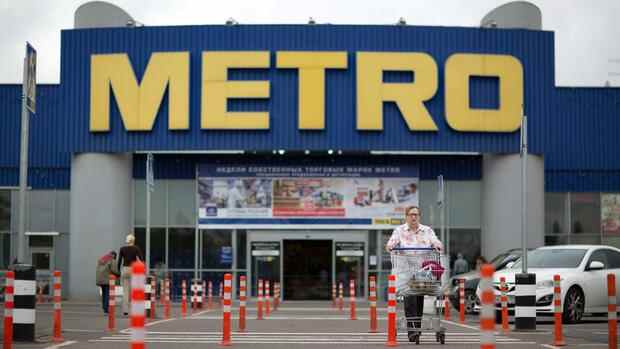Dusseldorf Despite high special charges and public criticism, Metro is sticking to its decision to continue doing business in Russia. “We look at it every day to see whether the decision can be upheld,” said CEO Steffen Greubel on Thursday. There is a crisis team for that. Metro published its half-year results on Wednesday evening. In addition to an overall positive sales development, this also showed write-downs of 200 million euros on the markets in Russia and the Ukraine.
The company is expected to be in the red for the year as a whole due to the special charges: “We have adjusted our expectations for the net financial result to around minus 320 million euros,” said CFO Christian Baier on Thursday with a view to the 2021/22 financial year. The share price temporarily lost more than seven percent to 7.79 euros by midday. After falling to under seven euros at the beginning of the Russian attack on Ukraine, Metro shares had been recovering since the beginning of March.
When asked what would have to happen for the company to withdraw from Russia after all, Greubel, who had been in office for a year, explained that in addition to supplying the population with food and worrying about employees and management as well as the assets, customer and employee reactions also played a role a role. It is a “multivariable decision”.
The wholesale company operates 93 stores in Russia and employs 10,000 people. Personally, Greubel explained, it was a “dilemma situation” for him in view of the pictures from the Ukraine. He condemned the war and said the priority between the two markets was clearly Ukraine.
Top jobs of the day
Find the best jobs now and
be notified by email.
An average of 20 of the wholesaler’s 26 stores before the start of the war are currently open there. The 3,400 employees would receive all conceivable support and salaries. In March, sales there fell by 45 percent compared to February, but were still ten percent higher than in the same period last year. In the Ukraine, the wholesaler recently had annual sales of around 800 million euros.
Metro makes ten percent of total sales in Russia
In Russia, business is local, explained Greubel. 90 percent of the procurement is done locally, 93 percent of the goods are groceries, and since the beginning of the war there have been no more investments in growth. After an increase of around 16 percent in local currency due to panic buying and inflation, the pace of growth in Russia slowed down in April.
The Metro concern is in a bind because almost all Russian markets are directly owned by the company.
(Photo: imago images/sepp spiegl)
The business accounts for around ten percent of total sales across the group. In the past fiscal year 2020/21, Metro generated sales of around 2.4 billion euros in Russia. In the second quarter, which ended at the end of March, it was 575 million euros.
On average, the Metro group owned around half of the properties in the various markets, said Greubel. In Russia, on the other hand, 89 of the 93 markets are almost all. There are few alternatives to ownership there, Greubel explained when asked. The risk has been taken into account in the write-downs already made.
>> Read also: Metro writes off hundreds of millions on deals in Russia and Ukraine
According to the half-year balance sheet, the Düsseldorf-based company had to write off around 319 million euros in the past quarter, more than 200 million euros of which related to its activities in Russia and Ukraine. The bottom line was therefore a loss of 284 million euros, compared to a minus of 131 million in the same period of the previous year.
While growth in Germany was below average at less than three percent, total sales in the quarter grew by almost 24 percent to 6.2 billion euros, adjusted Ebitda rose from 114 in the same period last year to 157 million euros.
Digitization of gastronomy should drive sales
In April, Metro raised its sales forecast from three to seven percent to nine to 15 percent. Adjusted operating profit (Ebitda) is expected to increase slightly to moderately, after previously predicted figures at the previous year’s level. The growth drivers were inflation and the catch-up effects from the pandemic and the multi-channel strategy with a major focus on the digital business, which is expected to grow to 40 percent of sales by 2030, as Greubel had already announced at the end of January.
>> Read also: Metro boss prescribes aggressive growth course
The focus is on the recently acquired Dutch company Eijsink, which is digitizing the hospitality industry. The missing piece of the puzzle has so far been the payment system, and Eijsink is now bringing that with him. “We’re heading in the right direction,” emphasized Greubel.
However, inflation is also causing confrontation on the procurement side, explained Greubel: “We are confronted with massive price demands.” However, based on experience in highly inflationary countries like Turkey, they are professionally prepared and are stocking up. Metro expects inflation rates of between eight and ten percent over the year.
More: New strategy: Metro boss gives up other foreign markets
